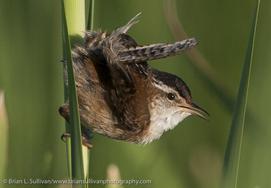MARSH WREN OR-371
The Pacific Coast, South Slough Sanctuary, Coos Bay, Oregon
May 22, 7:50 a.m.
Sunrise at 5:45 a.m.
A community of singing marsh wrens. I have waded out into the marsh, and for a little over six minutes stand about five yards from one marsh wren as he sings; all the while I concentrate on the background bird who is about 20 yards away, listening for how they might be interacting. And, yes, I do hear some of what these birds are known for!
Studying the sonagrams, I can easily identify when one of the birds chooses a song that matches the other. At 0:16-0:19, the foreground bird matches the background male, and again at 0:27-0:30; from 0:53-1:00 is a pair of matches, the foreground bird matching the background bird twice in a row.
From 1:48-1:52, it's the reverse, the background male matching the foreground male, revealing that it is not always one bird who matches the other. Check out the matching events at 2:14-2:18 (matching first half of double song), 2:34-2:38, 2:45-2:48, 3:22-3:26, 3:38-3:40.
It gets even more interesting from 4:38-4:45. The background male has been silent for a while, and at 4:40 he surfaces and energetically sings a double song (say, AB). The A part matches what the foreground bird has just sung, and the foreground bird follows this double song by singing the B portion of the song. As if the intensity has escalated too far, the foreground bird begins calling and then falls silent for nearly 25 seconds.
In about 80 songs from the foreground male, I count 11 matches between this foreground male and the nearest background male. Put simply, that means that about every seven songs, one of these birds makes a decision to pull out of his repertoire hat the song that best matches his neighbor. Given that the hat might contain 150 or more songs, that's quite a feat. These are not random matches; no, these birds know their songs and how to address each other with identical songs, or not. As to what they are doing and what they're trying to accomplish with this matching game, well, only they really know (but it's my hunch that it's a male-male contest, and the females are listening).
Background
Wind blowing the rushes around, and other marsh wrens.

Photo by Brian L. Sullivan
